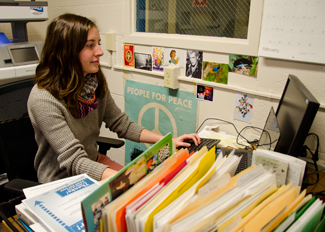The University of Idaho placed seventh on the Peace Corps’ 2013 Top Colleges list among medium-sized schools for the number of volunteers it produces.

Hayden Crosby | Argonaut
Environmental Science senior Alex Rheault works at the Sustainability Center office. She is in the process of joining the Peace Corps, a volunteer program run by the United States government.
According to the Peace Corps’ list, 33 UI undergraduate alumni are currently serving worldwide. The Peace Corps identifies the top volunteer-producing colleges in the country and compiles a list of 25 universities for acknowledgment. This year, the highest spot in the medium-sized colleges’ category went to Western Washington University in Bellingham, Wash. with 73 volunteers.
In 2012, UI did not make the cut.
Historically, the university has produced 521 volunteers total, sending people as far as the Kingdom of Lesotho, in sub-Saharan South Africa, said the Peace Corps Regional Representative Marya Nowakowski.
UI senior Alex Rheault is among the Vandals joining the ranks in August. According to the Official Peace Corps Catalog, 90 percent of Peace Corps volunteer positions require a bachelor’s degree. After Rheault’s intensive application and interview process, she was accepted and is now waiting for an environmental education assignment. Rheault said she is still unsure of what country she will be placed in.
“I would really love to go anywhere,” Rheault said, “I just think the Peace Corps is an important organization.”
Rheault said she has been volunteering with her family since she was little and has had a passion for it since then. The opportunities presented by volunteer work made her think a lot about her future. She said she would like to aid the Peace Corps in educating the world about environmental issues.
“Not only teaching people about the environment, but learning from them and learning about myself too,” Rheault said.
Rheault said some of the interview process was intense. Questions including, “Do you have anything tying you here?” and “What is your support system going to be like when you can’t reach your family?” are just a few that made Rheault deeply consider her decision. Ultimately, Rheault said she knew this is what she wanted to do.
“I could be walking 12 miles every day to my work place, but I’m excited,” Rheault said. “It’s going to be a completely different lifestyle.”
Dean of Students Bruce Pitman, said Peace Corps is a great opportunity for graduates.
“I think it’s terrific news,” Pitman said, “I’m delighted that we have alumni that are so moved to participate in Peace Corps and do this important work.”
Pitman said UI has a great ethic of service and is glad to promote this service and offer academic majors that allow students to prepare for service, particularly in the Peace Corps.
“I think we have people who have a heart for it,” Pitman said.
Nowakowski said once an applicant has been accepted, they spend three months training while living in their host countries. It is there that volunteers begin to learn the local language and familiarize themselves with their country’s traditions.
“It’s very intensive,” Nowakowski said. “The host family is instructed to only speak to the volunteer in the language they’re learning.”
During this three month period, most volunteers live with host families and focus on the technical skills needed. Technical training is designed to help a volunteer learn the basics of their future work. There are many Peace Corps programs, including education, public health and agriculture. When training is complete, they are armed with language, technical and customary skills needed to begin their work, Nowakowski said.
“Each country designs their own program,” Nowakowski said.
He said for example, volunteers learn about specific public health issues of the country they are in.
Volunteers are then ready to fully immerse themselves in the new culture and devote two years to living and working with the overseas community. The type of work available is widely varied and is based on the needs of the host country, as aligned with the strengths of individual volunteers, Nowakowski said. The Peace Corps places volunteers where they are needed.
Currently, the Peace Corps sends volunteers to more than 70 countries. Forty one percent of volunteers serve in Africa, but opportunities exist all over the world. Asia, the Pacific Islands, the Caribbean, Latin American, Europe and the Middle East all host volunteers as well.
The application process for the Peace Corps is intensive
and should require serious thought, but is available online, Nowakowski said.
“We ask a lot of questions,” Nowakowski said. “It’s not your typical job application.”
The application questions allow potential volunteers to tell the Peace Corps what their skills are. Hands-on experience, such as previous jobs, 4-H or farm work, is taken into account. An applicant’s coursework, spoken languages and undergraduate major are also considered, Nowakowski said.
After the application is complete, a potential volunteer will go through an interview process and finally be nominated by the regional representative and invited to join the Peace Corps.
The Peace Corps offers personal benefits such as deferment of student loans, free medical and dental care, grad school programs with financial assistance and two years of international work experience.
Those interested in volunteering are encouraged to meet one-on-one with a recruiter who can answer all of their questions. Nowakowski‘s office is located in Spokane and she can be reached at [email protected].
Alycia Rock can be reached at [email protected]